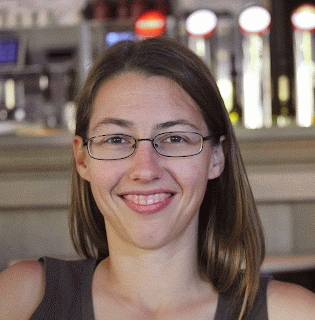An Introduction to Dr Veerle Vandeginste, her research and travels
By Dr Veerle Vandeginste; Assistant Professor in Geochemistry
 |
I would like to introduce myself here. Originally, I am from
Ieper (Ypres), a fairly small city in West Flanders (Belgium), known for the
intense battles that were fought in the area during the First World War. Besides
the many war graves in and around Ieper, the Menenpoort (Menin Gate) is a
well-known Memorial to the Missing, where every evening since 1928 (except for
a period during the Second World War), at 8pm the Last Post is sounded in
memory of British soldiers who fought and died there. West Flemish people are
known to have the most difficult to comprehend dialect in the country, and we
also tend to be hard working, rather introvert, and down-to-earth.
In terms of studies and research, my background is in geology, acquired through a Licentiaat (equivalent to MSci) and subsequent PhD, of which I obtained both at the KU Leuven (Belgium). My PhD focused on diagenesis, i.e. physicochemical changes that impact sediments and sedimentary rocks from the time of deposition till the onset of metamorphism (around 200ºC and 250MPa). I focused mainly on diagenesis in carbonate rocks. One of the key aspects I really enjoyed in my PhD research was the multidisciplinary nature, whereby concepts in sedimentology, field work, a variety of microscopic and geochemical methods and a range of structural geological approaches were combined to derive new interpretations on the evolution of fluid flow through geological time and related diagenetic processes in the study area of the Canadian Rocky Mountains.
Upon finishing my PhD, I joined the Geological Survey of
Belgium (a division of the Royal Belgian Institute of Natural Sciences), where
my research mainly concentrated on carbon capture and storage. This was also a
very interesting and exciting time, where I got to explore the engineering side
of things, with a focus on transport of carbon dioxide through pipelines, and
getting into planetary sciences, with some research on the mysteries of
meteorites. In my leisure time, I studied forensic sciences. Besides my
eagerness of learning more about other disciplines, I also wanted to gain the
experience of immersing myself in a different culture by living and working abroad.
So, this is what I did.
I first went to CEREGE (Aix-en-Provence, France) for a
postdoc, where my research focused on sedimentology and diagenesis of Miocene
carbonate rocks from Mallorca, and subsequently, I started a postdoc position
in the UK at Imperial College London. In London, I was fortunate to become part
of the biggest program ever being funded at Imperial, namely the Qatar
Carbonates and Carbon Storage Research Centre. This research opened a new world
to me, as it enabled field work in the Middle East and many interactions with
people working both in industry and academia in the Middle East, as well as
local people we met during our field work at remote localities in Oman. Since
2012, I have been Co-Investigator on this project which involves an amazingly dynamic
and interdisciplinary team of researchers who perform fundamental research that
tackles current challenges regarding the storage of carbon dioxide in
subsurface carbonate reservoirs.
 |
| Hiking in the heat for field work in Oman |
 |
| Field work in Oman is not without its hazards - mind the camels! |
My research interests build upon my previous expertise in
diagenesis, primarily dominated by my research in geochemistry and rock
mechanics (or structural geology), and this in an energy framework, with a
primary focus on carbon storage, besides conventional and unconventional
hydrocarbon extraction and radioactive waste disposal applications. Currently, I
am in the process of acquiring funds to build unique, novel equipment for
chemo-mechanical experiments. This equipment will enable tackling fundamental
research questions of which the answers will help the applied industry. This
research benefits collaboration with experts across Chemistry, Engineering, and
Mathematics at the University as well as experts from the BGS.
I have a number of opportunities
for PhD studentships through a range of doctoral training programs at the
University and encourage high calibre candidates, who are keen to join a
dynamic research group and excited to do energy-related multidisciplinary research,
to get in touch. This research promises to make a difference and I fully embrace
what lies ahead!
Did you know?
Veerle has also wrote a blog for the GERC Diary about her fieldwork applying novel methods (drones and ground penetrating radar) to map dolomite bodies in the Carboniferous carbonate host rocks of the Caliza de Montana and Picos de Europa formations. You can read it here
Veerle has also wrote a blog for the GERC Diary about her fieldwork applying novel methods (drones and ground penetrating radar) to map dolomite bodies in the Carboniferous carbonate host rocks of the Caliza de Montana and Picos de Europa formations. You can read it here
*You can keep up to date with GERC activities on our social media channels*
Comments
Post a Comment